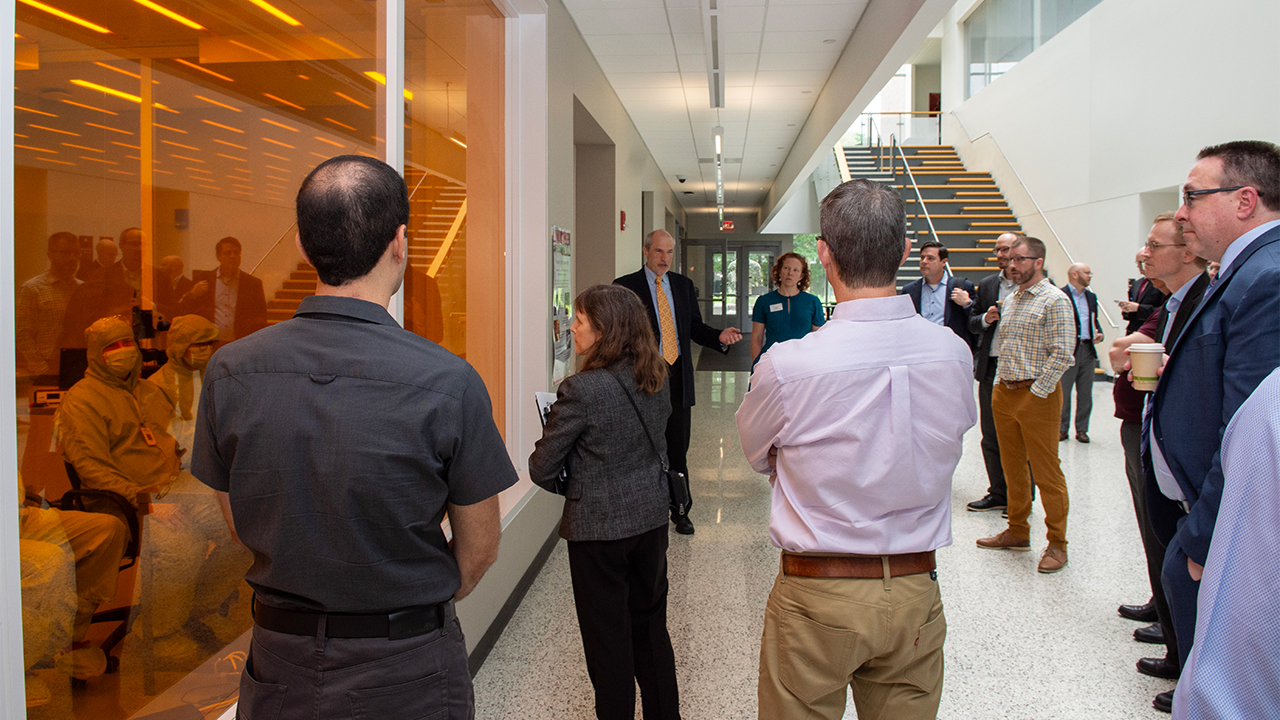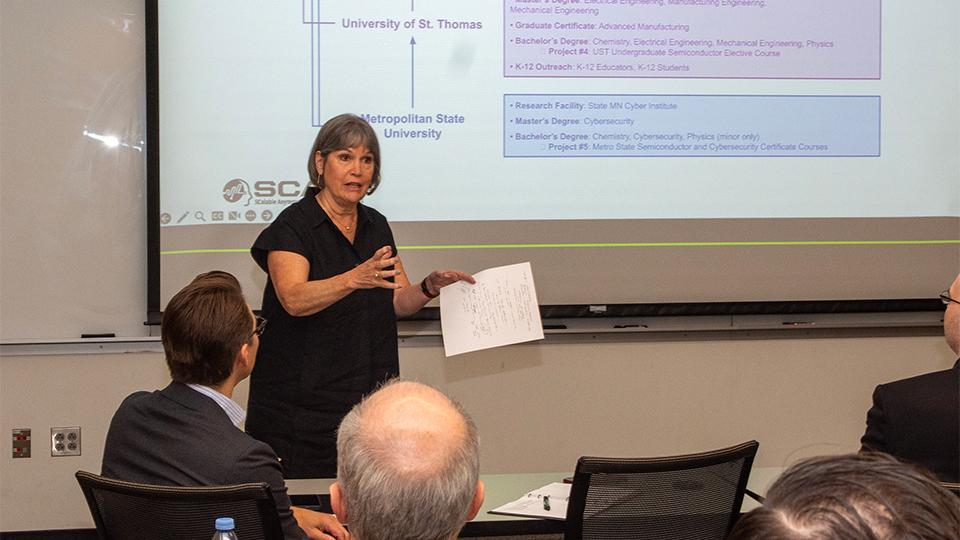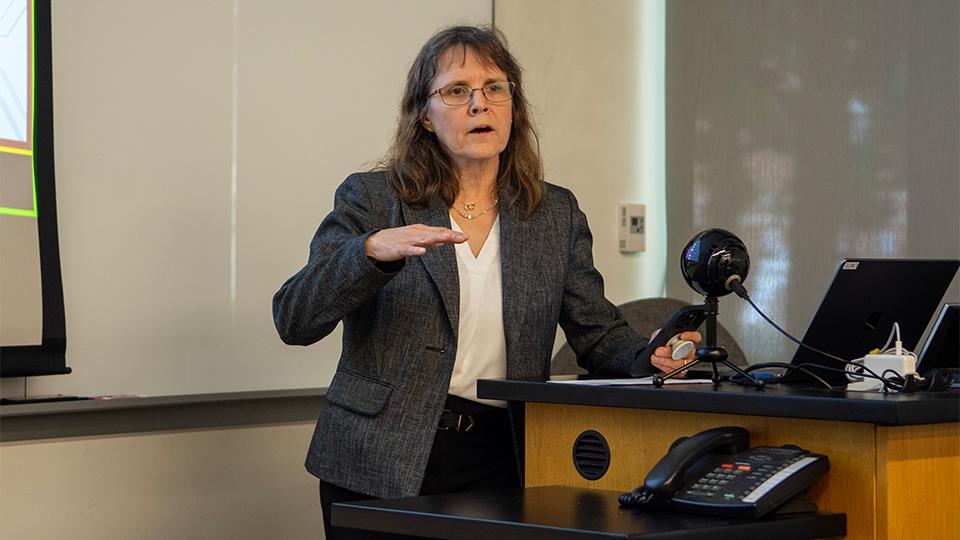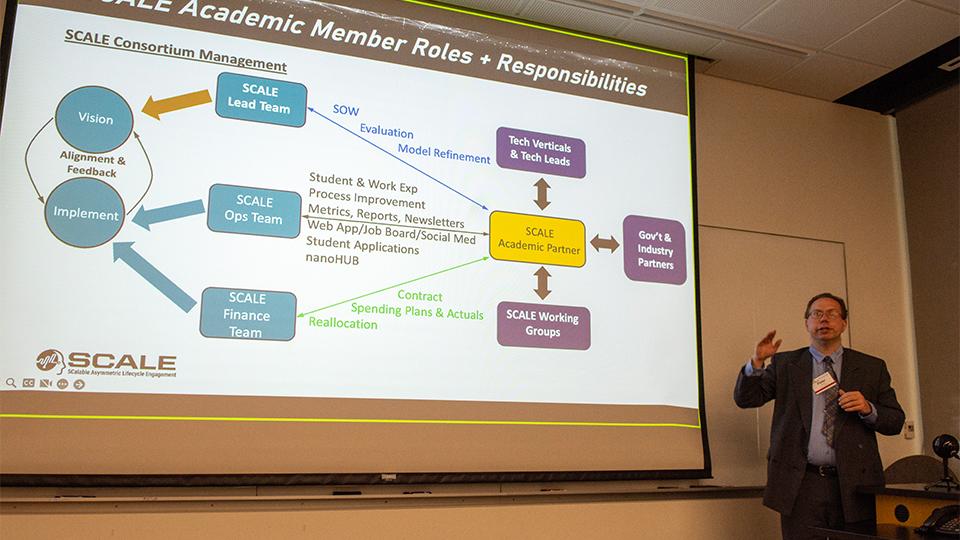
Prof. Steve Koester, UMN Chief Semiconductor Officer, leads SCALE program partners on a tour of the MN Nanocenter.
On Tuesday, June 18, several dozen academic, business, and government leaders met at the University of Minnesota to mark the official launch of the University’s participation in SCALE, a workforce development program sponsored by the Department of Defense.
Scalable Asymmetric Lifecycle Engagement (SCALE) is a network of universities brought together to meet the semiconductor workforce needs of the defense sector. Led by Purdue University, and administered through the Naval Surface Warfare Center Crane Division, SCALE provides coursework, internships, and focused research projects for both graduate and undergraduate students aimed at targeted microelectronics specialty areas. In Minnesota, Metro State University, University of Minnesota, and University of St. Thomas have joined SCALE, and this membership is a reflection of the state’s strong semiconductor ecosystem and educational excellence.
SCALE consultant Mona Vakilifathi said that the program will be engaging with Minnesota’s defense microelectronics industry, including companies Collins Aerospace/RTX Corporation, ForwardEdge ASIC/Lockheed Martin, Honeywell, Polar Semiconductor, Trusted Semiconductor Solutions, and Skywater Technology.
Congresswoman Betty McCollum told the audience that she would continue to advocate strongly for funding for SCALE in her leadership role on the House Appropriations Defense Subcommittee, but that workforce development in the U.S. requires a team approach.

“When I first got to Congress in 2000, everybody talked about workforce, but nobody did anything,” she said. “Now we're serious about doing something and SCALE is what we need in the DoD to get it across the finish line to happen…We don't have the luxury in democracies anymore of thinking [workforce development is] going to happen by happenstance, because China doesn't do it by happenstance. Russia doesn't do it by happenstance. They do it deliberately and they tell people what they're going to do. They tell people what they're going to work on. They direct their budgets to go there. We're a democracy. So it's up to all of us to work together to be part of that team.”
Deputy Assistant Secretary of Defense for Enabling Technologies Melinda Reed highlighted the urgent need for a capable, semiconductor-ready workforce.

“Today the Department of Defense and the defense industrial base lack the clearable workforce necessary to fully onshore US microelectronics design, manufacturing, and production. Our objective is to create a sustained pipeline of US citizens that are microelectronics capable talent…We need to significantly expand programs like SCALE to meet DoDs critical technology goals, and today's event is one step in the right direction,” she said.
Shashank Priya, UMN vice president for research and innovation, reminded those assembled that “Minnesota actually was a place where a lot of chip-related technologies were born, but over time they migrated to different parts of the world. I think we are now in this renaissance mode. We are giving rebirth to many of the technologies all the way from materials to manufacturing processes to packaging.” He outlined his vision for a broader Upper Midwest Microelectronics Consortium, which would renew micro-electronics leadership in Minnesota and the entire Upper Midwest region in areas such as high voltage and radiation-hardened chips.
Under SCALE, the U of M will work with the University of St. Thomas and Metro State to develop a talent pipeline that will encourage more domestic students to pursue advanced degrees and employment in national security related fields.The Minnesota Nano Center (MNC) will play a key role in this initiative, as will Polar Semiconductor, as explained by Steven Koester, Director of the MNC and Chief Semiconductor Officer at the U.
“Our SCALE work is going to be operated in part through the MNC, so students are going to get a lot of hands-on experience with microfabrication,” Koester said. “It’s a great resource for our faculty and students, and now for developing talent outside the U. MNC, along with the Technological Leadership Institute, recently completed a new training program for 60 employees of Minnesota microelectronics companies, providing them with a comprehensive overview of how integrated circuits and other microdevices are made. We will also be partnering with Polar Semiconductor to mentor the students and also provide them with insight into the real-world aspects of semiconductor manufacturing.”
As part of SCALE, researchers at the University of Minnesota will investigate so-called "radiation hardened" semiconductors, which have important applications in satellite communications and other defense-related applications. Koester said the University will work with staff at leading semiconductor manufacturer Polar Semiconductor to co-advise graduate students performing the research. In this way, the projects will be real academic research undertakings but with industry input and relevance.
“It's making sure that we're meeting the industry needs and also, hopefully, developing a pathway for the student to be able to get a job in industry,” Koester said. He also expressed excitement at the possibility of holding semiconductor-related bootcamps and short courses at the MNC for St. Thomas and Metro State University undergraduates to generate more interest in chips-related careers. Finally, Koester also said that the U will be engaging with other DoD semiconductor companies in the region to provide multiple employment opportunities for the students.

Other speakers at the event included Dr. Peter Bermel, co-director of SCALE and professor, Purdue University; Peter Frosch, CEO GREATER MSP/Minnesota Chips Coalition; Dr. Faisal Kaleem, director of MN Cyber Institute and professor, Metropolitan State University; Dr. Tamara Moore, professor and university faculty scholar, Purdue University; Dr.. Kara Perry, education and workforce development co-lead, NSWC Crane; Mike Ritzenthaler, CFO, Polar Semiconductor; Dr. Travis Thul, senior fellow and director of operations, Technological Leadership Institute; Dr. Mona Vakilifathi, president and principal consultant, education to workforce solutions; Dr. Hassan Salamy, chair of electrical and computer engineering and associate professor, University of St. Thomas; and Christopher Sowers, SCALE work experience leader, Purdue University.
You can review presentations from the SCALE launch here.